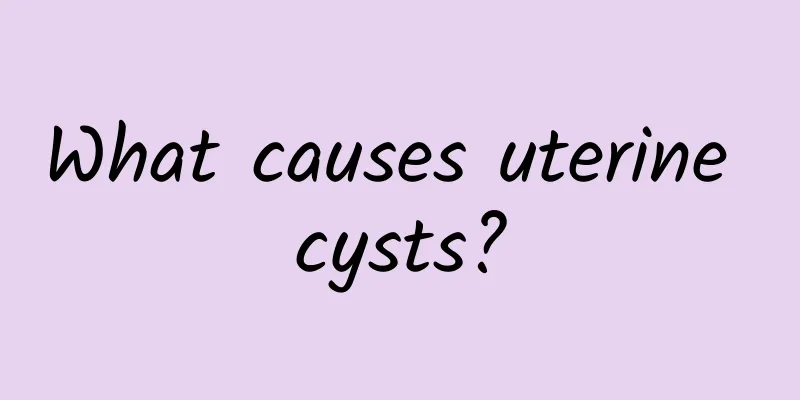What causes uterine cysts?

|
Uterine cysts may be caused by a combination of genetics, environmental factors, physiological abnormalities, and pathological diseases. Identifying the cause will help to take timely treatment measures to avoid worsening of the disease. 1. Genetic factors: Uterine cysts may be related to family heredity. Some women have a history of similar diseases in their family, which indicates that physical susceptibility may lead to cyst formation. Regular physical examinations, especially for women with a family history, should be vigilant to detect potential problems early. 2 Environmental factors: Long-term exposure to chemicals such as plasticizers, smoking or living in a polluted environment may increase the risk of uterine cysts. In addition, bad living habits such as staying up late and irregular diet can also cause imbalance in body hormone levels. It is recommended to avoid exposure to harmful environmental stimuli and develop the habit of regular sleep and healthy diet. 3 Physiological factors: Hormonal fluctuations in the body, especially high levels of estrogen, can cause uterine cysts to form. This is often related to puberty, pregnancy, or menopause. Controlling your weight, avoiding chronic stress, and using hormone medications regularly can help maintain a balanced hormone balance in the body. 4 Pathological factors: Certain diseases such as endometriosis, uterine fibroids or chronic pelvic inflammatory disease can induce cysts. These pathological changes may cause local inflammation and tissue hyperplasia, promoting cyst formation. Treatment options include drug control such as nonsteroidal anti-inflammatory drugs, hormone therapy such as oral contraceptives, and surgical treatment such as cyst removal surgery or laparoscopic minimally invasive surgery. The specific plan needs to be decided by the doctor based on individual circumstances. Uterine cysts are often the result of a combination of factors. It is recommended to see a doctor as soon as possible when symptoms occur and follow the doctor's advice to undergo necessary examinations and treatments, such as color Doppler ultrasound or hormone level testing. At the same time, maintaining a healthy lifestyle can also help prevent and reduce the risk of recurrence. |
<<: What supplements are effective for functional uterine bleeding?
>>: Is corpus luteum cyst common in early pregnancy? Will it cause miscarriage?
Recommend
Early understanding of the symptoms of uterine fibroids is the key to treatment
In order to avoid the deterioration of uterine fi...
Beware of Cushing's disease if you have excessive weight gain, moon face, and bruises
Many people have a particularly good appetite in ...
What kind of exercise is suitable for people with uterine fibroids? What kind of exercise is good for people with uterine fibroids?
What kind of exercise is suitable for people with...
Can second degree cervical erosion lead to infertility?
Will second degree cervical erosion lead to infer...
Two prescriptions for endometriosis
Two prescriptions for endometriosis Endometriosis...
What to do about vulvar leukoplakia? You can improve it through these 3 aspects
The patient's external leukoplakia will be ac...
What should I do if my menstruation is always delayed for a long time?
What should I do if my menstruation is always del...
It is necessary for people to master the prevention methods of uterine fibroids
At present, the incidence of uterine fibroids is ...
Analysis of several common causes of adnexitis
As people pay more attention to women's healt...
Menstrual period is an important period for the onset of pelvic inflammatory disease
Through understanding the causes of pelvic inflam...
Treatment for chocolate cysts
Electrocautery: Electrocautery is used to remove ...
Can multiple uterine fibroids cause miscarriage? How to treat uterine fibroids?
Uterine fibroids are very serious and have a high...
How much does it cost to induce labor in the fourth trimester? What are the precautions before and after the operation?
Induced labor refers to the use of artificial met...
Causes of pelvic inflammatory disease
Causes of pelvic inflammatory disease 1. Not payi...
Indications and contraindications for abortion
Artificial abortion, also known as artificial abo...









